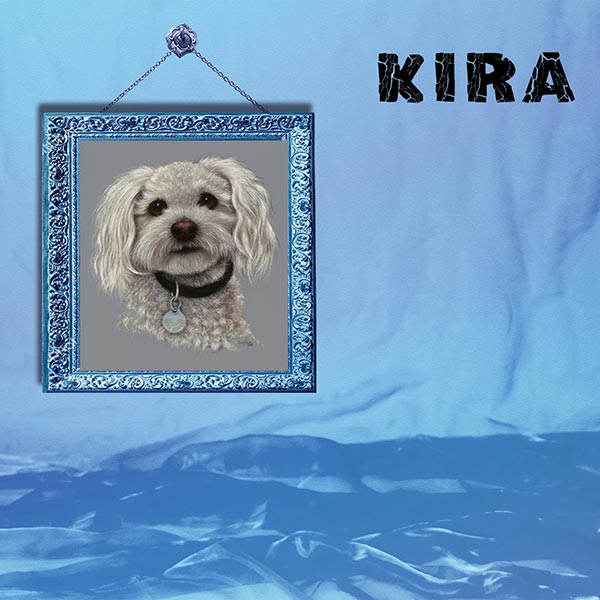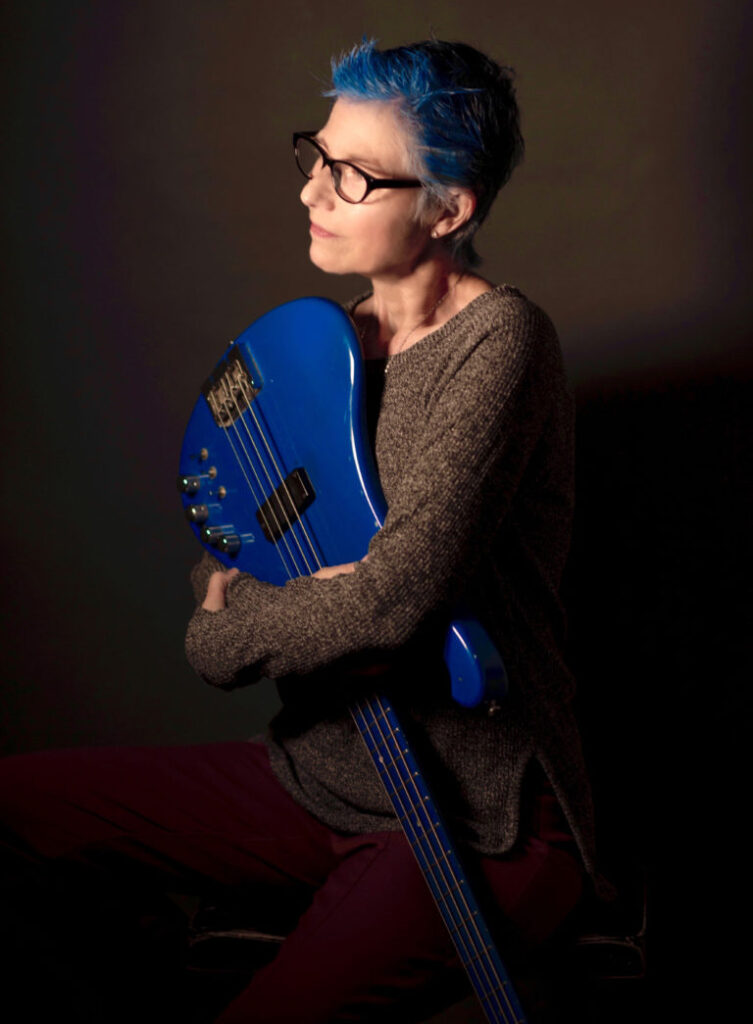She’s a punk rock icon, a bass hero, an award-winning sound editor, and now a solo recording artist. But the biggest part of Kira Roessler’s identity comes back to being a bass player.
“Bass player first and foremost – this is just who I am,” she says. “Then a sound editor, dog mom, loving wife, and loner.”
Roessler has played with several influential punk rock bands, and most recognize her as the bassist for Black Flag. During her brief tenure from 1983 to 1985, the band released five albums in addition to their steady touring schedule. If that wasn’t enough, she was simultaneously attending UCLA to major in applied engineering, taking classes and tests in between tour legs.
After Black Flag, she teamed up with Minutemen bassist Mike Watt (to who she was married from 1987 to 1994) to form the bass duo Dos. Their unique tangle of low frequencies has been an enduring and inspiring sound for bassists, especially.
Roessler’s “day gig” is as a dialogue editor for films. She’s pieced the speech together for Confessions of a Dangerous Mind, The Twilight Saga: New Moon, and Under the Tuscan Sun. More recently, she was on the sound editing team that won an Oscar for Mad Max: Fury Road.

With all that under her belt, she released her first solo album, Kira, late last year. The music is deeply personal, even heavy at times. Her sparse sensibilities and twisting bass lines draw you into her emotions over the 10 songs. Roessler admits the record came by surprise after her brother Paul offered to produce it.
We caught up with Roessler to get the scoop on all that and more, including how the bass is her lens to the world.
Kira is available now digitally via iTunes and Amazon MP3.
I know you’ve said you’re a bass player through and through. What brought this solo album about now?
I’m a bass player, but what I mean when I say that isn’t necessarily that I play all the time. It’s that it’s my identity. I mean, I’ve been playing bass longer than I’ve been a woman, you know? So if you think about it that way, it’s like an extension of myself. And so when I have feelings to express or situations to process or whatever, the bass is how I communicate. It’s how I express it. It’s how I get through difficulties or joys. For me, it is the mechanism by which I process life.
My process just is one where I spend time in the room writing, and I may have at any given time 20 songs going that are in various stages of completion. I keep sort of a list and then at any time when I sit down, I might grab one of those and push it a little further. This has been going on for many years. The intention isn’t necessarily to generate published work in a way; it is to, like I said, process my life.
Once I have a couple of bass lines and some singing or whatever, I send it to my collaborators who I’ve been working with virtually for many years. [The] guitar player in Ohio who does some beautiful work, Glen Brown, is on the record as well as a local drummer, Dave Bach, but we don’t work together on these songs. I send them to him and he works at his convenience. Most of the time my work happens at 6:30 in the morning. Who wants to do that with me? [laughs]
After the pieces start to fall into place, I usually do go to Kitten Robot Studio where my brother, Paul and I finish the songs and maybe add little elements, or sort of mix and polish. Then, quite to my surprise, he said, “Kitten Robot wants to put out a solo record.”
This set of songs is actually sort of a chronological story that starts 13 years ago, and the last song is very much current. It felt like I had finally gotten to a place with it, so when he said that, for whatever reason, I just felt like, “Okay, this is the time I’ll actually take that next step.” Again, that wasn’t necessarily the plan, but it seems like it’s been a really good moment to capture this particular set of songs, and people have been very kind about it. So I appreciate that.
You’ve been a part of a lot of incredible projects. Does it feel much different to release a solo album?
Well, it’s been… it feels very strange. It’s very different when you’re collaborating. Bands are rarely democracies, right? So a lot of the times when I’ve been playing I’m a contributor, but not necessarily a driving force. So some of the things that might come naturally to people, like the visual art of coming up the look for the record or a music video where you have to have a visual idea of what to do. These things to me were somewhat new and different, even though I have been doing this forever.
It felt like this thing was building and building. We released the music video and so there’s been this sort of a slow burn into this moment of release. And yeah, I gotta say it feels totally different. I feel completely naked and that makes sense because this work too is basically about exposing raw emotion. It’s a very sparse, purposefully, honest and clear sharing of some feelings that hopefully other people can connect to.

With all that under her belt, she released her first solo album, Kira, late last year. The music is deeply personal, even heavy at times. Her sparse sensibilities and twisting bass lines draw you into her emotions over the 10 songs. Roessler admits the record came by surprise after her brother Paul offered to produce it.
We caught up with Roessler to get the scoop on all that and more, including how the bass is her lens to the world.
Kira is available now digitally via iTunes and Amazon MP3.
I know you’ve said you’re a bass player through and through. What brought this solo album about now?
I’m a bass player, but what I mean when I say that isn’t necessarily that I play all the time. It’s that it’s my identity. I mean, I’ve been playing bass longer than I’ve been a woman, you know? So if you think about it that way, it’s like an extension of myself. And so when I have feelings to express or situations to process or whatever, the bass is how I communicate. It’s how I express it. It’s how I get through difficulties or joys. For me, it is the mechanism by which I process life.
My process just is one where I spend time in the room writing, and I may have at any given time 20 songs going that are in various stages of completion. I keep sort of a list and then at any time when I sit down, I might grab one of those and push it a little further. This has been going on for many years. The intention isn’t necessarily to generate published work in a way; it is to, like I said, process my life.
Once I have a couple of bass lines and some singing or whatever, I send it to my collaborators who I’ve been working with virtually for many years. [The] guitar player in Ohio who does some beautiful work, Glen Brown, is on the record as well as a local drummer, Dave Bach, but we don’t work together on these songs. I send them to him and he works at his convenience. Most of the time my work happens at 6:30 in the morning. Who wants to do that with me? [laughs]
After the pieces start to fall into place, I usually do go to Kitten Robot Studio where my brother, Paul and I finish the songs and maybe add little elements, or sort of mix and polish. Then, quite to my surprise, he said, “Kitten Robot wants to put out a solo record.”
This set of songs is actually sort of a chronological story that starts 13 years ago, and the last song is very much current. It felt like I had finally gotten to a place with it, so when he said that, for whatever reason, I just felt like, “Okay, this is the time I’ll actually take that next step.” Again, that wasn’t necessarily the plan, but it seems like it’s been a really good moment to capture this particular set of songs, and people have been very kind about it. So I appreciate that.
You’ve been a part of a lot of incredible projects. Does it feel much different to release a solo album?
Well, it’s been… it feels very strange. It’s very different when you’re collaborating. Bands are rarely democracies, right? So a lot of the times when I’ve been playing I’m a contributor, but not necessarily a driving force. So some of the things that might come naturally to people, like the visual art of coming up the look for the record or a music video where you have to have a visual idea of what to do. These things to me were somewhat new and different, even though I have been doing this forever.
It felt like this thing was building and building. We released the music video and so there’s been this sort of a slow burn into this moment of release. And yeah, I gotta say it feels totally different. I feel completely naked and that makes sense because this work too is basically about exposing raw emotion. It’s a very sparse, purposefully, honest and clear sharing of some feelings that hopefully other people can connect to.
I think for most bass players, stepping out in front would feel foreign.
You know, I’ve been doing Dos for 30 years with Mike Watt, which is a little bit more like bass wars. Because it’s just two people, obviously my role is a little bit more formative. I write more of the songs and more of the lines. So that has been going on and was very much a shaping effect of my music. We decided very early to not have one bass laying the foundation and the other doing the melody. Instead, we wanted to syncopate and leave holes and find holes and come together in a very intertwined way.
And so that became sort of my mode of writing. Even though Mike’s very busy, my writing for a long time was geared somewhat to that dynamic. I sing a lot more on my own stuff than I do in Dos, but we did some singing songs and I covered some of my favorite singers.
So it doesn’t feel that unusual music-wise, it feels unusual personality-wise. I’m very much a play-alone-in-my-room person, so putting myself out there front and center feels a little strange. Although again, in Dos I did sort of become the “front person” because I was often on the mic.
When you’re writing, do things come to you from noodling on the bass, or do you start with a melodic idea in your head?
Generally speaking, there’s a seed of an idea or a feeling, or a situation. Then again, my bass is how I process, so there is not a bass line in my head. Nine times out of ten, I just start [with a] completely blank slate and my bass is my way to get that seed to start sounding like a song and make the music express that thing that’s in my head. But it’s a concept in my head and the bass turns it into music.
I sometimes feel a song just takes on a life of its own. I have the starting point and I push it along, but where it’s going to end up, I have no idea. Much like this record – I had no idea until after the fact.


